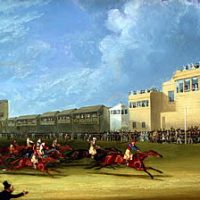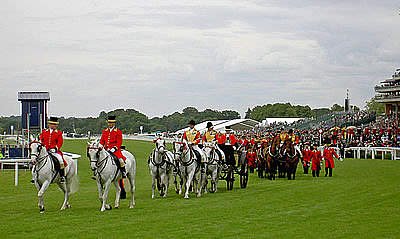The Royal carriages depart after The Queen’s arrival at the races.
Ascot Racecourse is one of the leading racecourses in the United Kingdom, hosting nine of Britain’s 32 annual Group 1 horse races.
The course, owned by Ascot Racecourse Ltd, enjoys close associations with the British Royal Family, being approximately six miles from Windsor Castle.
Ascot today stages twenty-six days of racing over the course of the year, comprising eighteen flat meetings held between the months of May and October inclusive. It also stages important jump racing throughout the winter months. The Royal Meeting held each June remains a major draw, its highlight being The Gold Cup.
The Gold Cup stands proudly as the showpiece event of Royal Ascot week and is the world’s premier race for horses that are specialists over long distances. Modern tradition has scheduled the race for the middle day (Thursday) of the meeting, when fashion and glamour that is so synonymous with the Royal Meeting reaches its zenith.
The Gold Cup is a Group 1 flat horse race in Great Britain open to horses aged four years or older. It is run at Ascot over a distance of 2 miles and 4 furlongs (4,023 meters), and it is scheduled to take place each year in June.
It is Britain’s most prestigious event for “stayers” – horses which specialize in racing over long distances. It is traditionally held on day three of the Royal Ascot meeting, which is known colloquially (but not officially) as Ladies’ Day. Contrary to popular belief the actual title of the race does not include the word “Ascot”. In 2016 it was run as “the Gold Cup in Honor of The Queen’s 90th Birthday.”
The Gold Cup is the first leg of Britain’s Stayers’ Triple Crown, followed by the Goodwood Cup and the Doncaster Cup. The last horse to win all three races in the same year was Double Trigger in 1995.

The Gold Cup is one of three perpetual trophies at the Royal Ascot meeting, along with the Royal Hunt Cup and the Queen’s Vase, which can be kept permanently by the winning owners. A number of horses have won it more than once, and the most successful is Yeats, who recorded his fourth victory in 2009. The winner of the 2016 Ascot Gold Cup was Order of St. George.
Top Owner Trophy to Be Awarded at Royal Ascot
Ascot Racecourse is delighted to announce that a Royal Ascot Leading Owner Trophy will be awarded next week.
The competition will run alongside the established equivalents for jockeys and trainers. Those two awards are both kindly sponsored by QIPCO.
Like the established jockeys and trainers’ awards, the champion owner over the week will be decided on straight wins, with seconds, thirds (etc.) only coming into play in the event of a tie for wins.
With the agreement of Coolmore, the operation will be regarded as one entity regardless of the precise ownership make up of any given horse or the colors they run in.
Charlie Liverton, Chief Executive of the ROA, welcomed the new initiative:
“Royal Ascot is one of the most eagerly anticipated meetings of the flat racing calendar and captures the imagination of horsemen both in the UK and overseas. The recognition of the part that owners play in the week long spectacle through the award of a leading owner trophy is very much welcome and it will be keenly contested.”
The eight Group One races at Royal Ascot are all QIPCO British Champions Series races and this year, the stable staff leading up the horses for those events will be provided with QIPCO British Champions Series gilets, all of which will carry the owners’ colors on the front.
“We’re very much looking forward to the Royal Meeting next week, with fields shaping well including a record turnout from the United States,” said Nick Smith, Director of Racing and Communications at Ascot.
